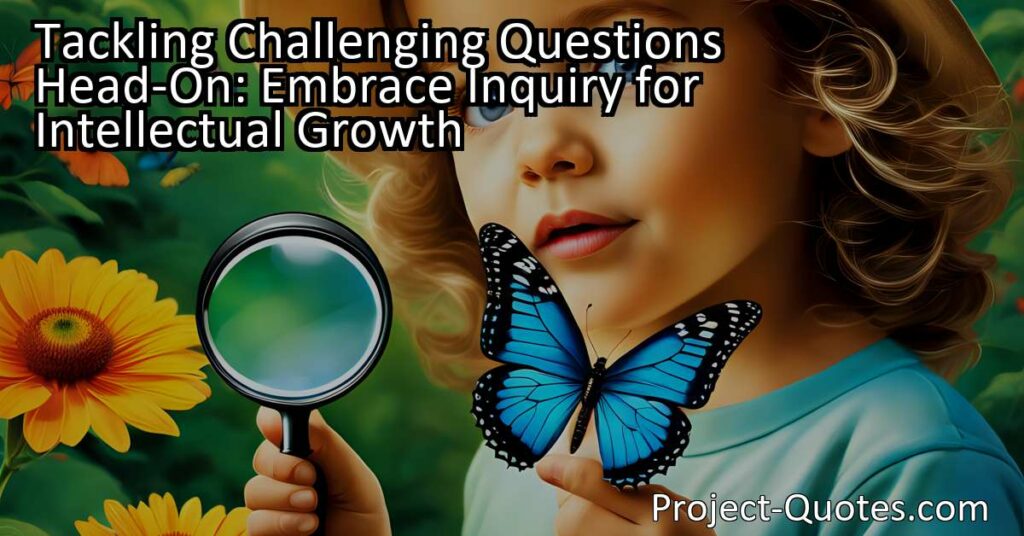It is error only, and not truth, that shrinks from inquiry.
Thomas Paine
Tackling challenging questions head-on is essential for intellectual growth. By embracing inquiry and fearlessly exploring new ideas, we can overcome errors and misconceptions, leading to a deeper understanding of the truth. With curiosity as our guide, we can expand our knowledge, contribute to societal progress, and strive for personal and intellectual growth.
Table of Contents
Meaning of Quote – It is error only, and not truth, that shrinks from inquiry.
In the realm of knowledge and understanding, it is often said that curiosity is the key that unlocks the doors to intellectual growth. The quote, “It is error only, and not truth, that shrinks from inquiry” by Thomas Paine, beautifully captures the essence of this idea. With an approachable tone, let us delve into the significance of this intriguing quote and explore how embracing inquiry can lead to the pursuit of truth.
To fully grasp the meaning behind Paine’s words, we must first understand the concepts of error and truth. Error refers to a mistake or a misconception, while truth represents an established fact or reality. The quote suggests that it is only error, not truth, that shies away from investigation. In other words, true understanding can only be achieved through fearless inquiry.
The beauty of Paine’s quote lies in the encouragement it provides to seek knowledge without hesitation or fear. It urges individuals to confront their preconceived notions and tackle challenging questions head-on. By embracing inquiry, we acknowledge and accept the potential for error, understanding that it is an essential part of the learning process.
In many aspects of life, we often encounter resistance to inquiry. Uncertainty can be daunting, and the fear of discovering our own fallibility can paralyze us. However, it is precisely during moments of uncertainty that we must summon the courage to explore uncharted territories. It is in these moments that growth and progress occur, both personally and intellectually.
One area where this quote resonates is in scientific inquiry. Throughout history, numerous scientific breakthroughs have been made by individuals who dared to question prevailing beliefs. Think of astronomers like Galileo Galilei or physicists like Albert Einstein. Both stepped outside the boundaries of accepted knowledge and pursued inquiries that led to groundbreaking discoveries.
For instance, when Galileo Galilei first questioned the prevailing belief that the Earth was the center of the universe, he faced strong resistance. His observations through a telescope suggested that our planet revolved around the Suna concept that challenged the existing social and religious order. However, Galileo’s unwavering commitment to truth and his determined pursuit of inquiry ultimately transformed our understanding of the cosmos.
Similarly, Albert Einstein’s theory of relativity revolutionized the field of physics. By questioning the established principles of classical physics, Einstein embarked on an intellectual journey that reshaped our understanding of time, space, and gravity. These examples highlight how inquiry, even in the face of significant opposition, can lead to profound advancements in knowledge.
Expanding beyond the realm of science, we can apply the concept of inquiry to other disciplines, such as history, literature, and even our daily lives. In the study of history, for instance, examining multiple perspectives and questioning the prevailing narratives allows us to gain a more comprehensive understanding of the past. By actively engaging in inquiry, we can challenge the historical accounts presented to us and discover alternative truths that may have remained hidden.
In literature, inquiry enables us to analyze themes, characters, and symbols in a deeper and more meaningful way. When we question the motives of fictional characters or explore the underlying messages within a story, we uncover layers of understanding that enhance our reading experience.
Moreover, embracing inquiry in our daily lives allows us to develop critical thinking skills and make informed decisions. Whether it is researching a topic of interest, fact-checking information, or seeking out different perspectives, the pursuit of truth enriches our lives and empowers us to become more knowledgeable individuals.
However, it is important to note that inquiry alone is not enough. Paine’s quote emphasizes that it is not truth, but error, that avoids inquiry. It implies that truth welcomes questioning and examination. While errors and misconceptions may appear intimidating at first, they provide valuable opportunities for growth and learning.
By acknowledging our errors and taking steps to rectify them, we open ourselves up to a deeper understanding of the truth. This self-reflection and willingness to confront our own fallibility allows us to continuously refine our knowledge, leading to personal and intellectual growth.
In conclusion, Thomas Paine’s quote, “It is error only, and not truth, that shrinks from inquiry,” reminds us of the importance of embracing curiosity and actively pursuing knowledge. Inquiry plays a vital role in the pursuit of truth, allowing us to challenge existing beliefs and explore uncharted territories. By daring to question, we not only expand our understanding of the world but also contribute to the progress of society. Let us heed Paine’s words and strive for intellectual growth through fearless inquiry.
I hope this quote inspired image brings you hope and peace. Share it with someone who needs it today!


